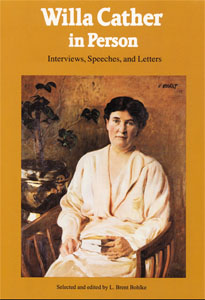from Willa Cather in Person: Interviews, Speeches, and Letters
Selected and edited by L. Brent Bohlke
Lincoln & London: University of Nebraska Press, 1986
1926: NEW YORK
In 1924, Willa Cather agreed to four interviews in nationally known publications. That was equal to the number of such interviews she was to grant in the next four years. In 1925 she granted two interviews and began making evident her distaste for the entire process. In 1936 or 1937 she wrote to a Mr. Byron expressing regret over some ot her early careless interviews and saying that she had since learned it was unwise to grant interviews at all (TLS, Beinecke Rare Book and Manuscript Library, Yale University, New Haven, Connecticut). She was beginning to be more protective of her privacy and more selfish with her time. "The Gossip Shop," a regular column of the Bookman, showed that growing tendency in Cather in the issue of October 1925:
From Denver comes news that Willa Cather spent the first two weeks of August there incognito. She was gathering some authentic tradition about the region for her new novel of Mexico and, being absorbed in her work, was desirous of no attention or publicity. It became necessary, however, for her to make herself known to the employees of the Denver Public Library, and Librarian Malcolm Wyer gave her a private tea at which the entire library staff was present. It can never be said that women cannot keep secrets—at least for a time—for these fifty women, respecting Miss Cather's wishes, said nothing of the secret entrusted to them and the press was never apprized of celebrity in their midst. Miss Cather visited Pueblo and Colorado Springs with the same good fortune. No one spotted her. It is reported that she has succumbed to one of those new cretonne jackets, that she is lovely and gracious, that she cannot mix women's clubs with hard work. (231)
That desire for seclusion in order to pursue her work becomes more and more pronounced in her correspondence and her declinations of public appearances. The Cather collection of the American Academy of Arts and Letters in New York City has as its greatest bulk twenty-four refusals from Cather in response to requests to appear on programs or serve on various boards or panels, all dating from 1928.
This short interview, obviously wrested from her in an inescapable moment, reveals her impatience with the press, her wit, and much about her personality. It also explains, in part, her feelings about authors and public appearances. As printed here, it is taken from the Nebraska State Journal. It seems obvious that the interview originally appeared somewhere else, probably a New York paper, but no source is indicated by the Journal, and the original appearance has not been located.
READERS AND WRITERS
Interviewed at the Grand Central station, where she was waiting for a train one hot July day, Willa Cather said:
"Yes, I'm getting out of town—it's rather evident. No, not west this time. I have just come back from three months in New Mexico. Now, I'm going up into New England."
"What part of New England?"
"Oh, several places! Mr. Knopf and Mr. Reynolds will always have my address if you should wish to reach me about something important. Seriously, I'm going away to work and don't want to be bothered."
"But this is vacation time."
"I've just had a long vacation in New Mexico. I need a rest from resting."
"Are you beginning a new novel?"
"No, I'm in the middle of one."
"When will it be published?"
"The book? About a year from now. The serial publication will begin sometime this winter. I want to finish the manuscript by the middle of February and get abroad in the early spring."
"I suppose, Miss Cather, it's no use to ask you for the title. You told me several years ago that you never announced the title of a new book until it was completed."
"Did I tell you that? Well, this time I'll make an exception. I don't like to get into a rut about anything. I call this book Death Comes for the Archbishop."
"And the scene?"
"Oh, that remains to be seen! My train is called."
"One general question on the way down, please. What do you consider the greatest obstacle American writers have to overcome?"
"Well, what do other writers tell you?"
"Some say commercialism, and some say prohibition."
"I don't exactly agree with either. I should say it was the lecture bug. In this country a writer has to hide and lie and almost steal in order to get time to work in—and peace of mind to work with. Besides, lecturing is very dangerous for writers. If we lecture, we get a little more owlish and self-satisfied all the time. We hate it at first, if we are decently modest, but in the end we fall in love with the sound of our own voice. There is something insidious about it, destructive to one's finer feelings. All human beings, apparently, like to speak in public. The timid man becomes bold, the man who has never had an opinion about anything becomes chock full of them the moment he faces an audience. A woman, alas becomes even fuller! Really, I've seen people's reality quite destroyed by the habit of putting on a rostrum front. It's especially destructive to writers, even so much worse than alcohol, takes their edge off."
"But why, why?"
"Certainly, I can't tell you now. He's calling 'all aboard.' Try it out yourself; go lecture to a Sunday school or a class of helpless infants anywhere, and you'll see how puffed-up and important you begin to feel. You'll want to do it right over again. But don't! Goodbye."
Nebraska State Journal, 5 September 1926.
